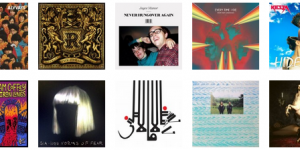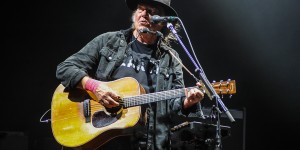Future Islands talk alter egos, the Smashing Pumpkins, and the upside to being sad
by Jabbari Weekes
July 7, 2014
The one-time "world’s most pretentious band" have become one of 2014's surprise breakout hitmakers.
“Man, ooh, AHHH. It just gets me right in my soul,” exclaims Future Islands singer Samuel T. Herring over John Coltrane’s “Lazy Bird.” The song’s chords, says Herring, have an emotional tinge that cuts deep into your being. And while hyperbole, the description isn’t out of place for a band interested in combining poppy ‘80s synths with stories of loss and broken relationships.
Inspired by a shared love of electronic band Kraftwerk, Herring, keyboardist Gerrit Welmers, and bassist William Cashion initially started a five-piece band called Art Lord and The Self Portraits. Christened by one reviewer as “the world’s most pretentious band,” the blueprint of Future Islands’ now infamous eclectic live sets began with Herring’s onstage portrayal of his character, Locke Ernst-Frost, a self-proclaimed German lord. However, members of the group—including Welmers and Cashion—grew tired of the shtick and wanted to pursue something more serious. With the departure of several members and relocation from North Carolina to Baltimore, the three finally repurposed themselves as Future Islands.
Since then, the band has dropped several albums, including In Evening Air and On the Water, to positive reviews but little interest from the public. By the same token, the strength of their live shows—particularly Herring’s inclination for seizure-like dancing—would create a cult following. Eventually, the rest of the world would follow after the band’s bizarrely entertaining performance on the Late Show with David Letterman. The song, “Seasons (Waiting On You),” has gone on to have a surprising life, spanning its early 2014 release into song of the summer territory.
Now, as the dust settles on their latest album, Singles, we spoke to the band for their thoughts on it, “Sleepytime Fuckups,” and whether sadness is a more powerful emotion than happiness.
AUX: Before we talk Future Islands, let’s talk Art Lord and the Self Portraits. What do you remember about recording “Sad Apples Dance”?
Cashion: That song was actually the only song that Art Lord released that was recorded in a studio. It’s kind of crazy that it would end up being the last song we released. I really love that song. I think that we’re never going to play it live because we wrote it before the band became Future Islands, but I still think it’s great.
Herring: I need to hear that song again. What does it say? I [we] say something about “Move your head down to the radio.” Then everything else is a blur.
W: Yeah, that was really cool it was really special to be involved with [Compilation Vol. 2: Songs from North Carolina] which featured all the North Carolina bands-including us- at the time.
William, did you really have a dream about buying a used copy of Phish’s Farmhouse?
Cashion: I remember when I was in high school I was really into the song “Heavy Things” and another song called “Farm House.” I’m all about giving bands a chance especially bands that have a huge following like Grateful Dead, or Phish; bands that maybe sort of get a bad rap. I gave Grateful Dead a chance and I really got into their album. I can’t really get into Phish although I do like some of their records.
Herring: It’s really kind of you to go and support these bands that already have like two million fans.
Cashion: Well, two million fans can’t be wrong. I mean maybe there’s something there. Anyway, I had the CD single for “Heavy Things” when I was in high school, but I never got the album and I decided recently I wanted to dive into it, but apparently it’s out of print now. So, yeah I just had a dream about it being gone, but maybe it’s only out of print in my head. I could probably go to ITunes and get it for $10.
Sam, I understand you’re making your acting debut as a preacher for the horror movie Tears of God. Please explain.
Herring: That was a three-day shoot back in January with a couple independent filmmakers from North Carolina. I play this preacher who ingested hallucinogens to catch these visions and it’s pretty crazy.
Basically, this couple came up to me after a show and said they were big fans. They were working on a film. They’ve been writing films for a couple years and they said they had this part that they thought I would be perfect for. Of course, I said I wasn’t an actor, but they said didn’t want me to act but perform like I do on stage. I said “Oh, I’ll give you that.” So, they sent me the script and I liked it, it was very interesting and very, very dark. I wrote them back and said, “How long do you need me?” They said three days, and I had the time off in January. I was like, “Perfect.”
Now that Singles has been out for some time, how do you feel about the album?
Herring: You know, I haven’t heard it in a while.
Cashion: I think for me, it’s important to give the record a break. We’ve all heard it so much leading up to the release that while we were recording Singles, I went back and listened to the our previous albums [On the Water and In Evening Air] for a breather. Since so much time had passed, it was really refreshing.
Are you guys ready to start moving on and recording the next album?
Herring: [Laughs.] Gerrit’s like, “You guys are crazy.” Me and William want to write. I just have a lot of feelings currently with everything that’s going on with us right now.
Do you think that, for your next album, you’re going to go far left with it? Or will you build off what you have?
Cashion: It’s hard to say at this point. I could see using our older approach with more experimentation, but also incorporating some of the new things we learned on Singles. For each record, we’re always trying to do it better than before. So, whatever that means to us, when the time comes, it’ll dictate [the direction], if that makes sense.
On “Sun in the Morning,” “Like The Moon,” or “Back in the Tall Grass,” there seems to be a unifying theme—coming home.
Herring: Well, “Back in The Tall Grass” was a song that [was] written in a time when I was missing somebody and the feelings of being on the road a lot. “Like The Moon” is a reference to—well, it’s kind of like what it says in the chorus—“And I can be the world, silent chatter held, I won’t be around.” It’s this idea that there’s this person that revolves around you or is orbiting around you, but you can’t be in their world. And maybe somewhere in there, there is that alien idea of a distant place that you can’t get to or want to get to.
“Sun in the Morning” definitely has a reference about understanding that sometimes you have to leave. In our line of work, sometimes you have to say goodbye and it really sucks, but that’s just a part of relationships. Sometimes, you have to say goodbye even when you’re together—business can take you away, but it’s always good to see that person again.
You’re known for your personal inflections. Is there ever a point where you [Cashion and Welmers] mesh your personal experiences into lyrical content? Or is that solely Sam’s domain?
Herring: When we were writing songs for Singles, long before we went into the studio, I asked these guys a few times if they had any thoughts or inputs. I think they were always like, “We’re good.”
Cashion: There have been times over the years where a song was written [by us].
Herring: I remember the song “Inch of Dust,” from our second album [In Evening Air]. Gerrit played us that song and I was like, “What is this Gerrit?” He named it “Inch of Dust,” and I was like, “What does that mean to you? This song is so good.” He’s like, “You find a stack of pictures or you find that picture in the closet, and you pick it up and there’s like an inch of dust on it just sitting there.” You said something like that and I was like, “Oh my god that’s so deep. I’m going to use that. “
Welmers: That one was post-move to Baltimore and breaking up with my girlfriend. Somewhere along those lines.
Herring: Back in the day with Art Lord, I was kind of having a writer’s block. I was flipping through one of William’s notebooks after class. I read some of it and I asked him if I could take it home, and I ended up writing a song using his notes. It’s called, “Sleepytime Fuckup.”
That’s an amazing name.
Herring: It was actually a sad little journal entry that William had written in at 3 p.m. He had just woken up and missed all of his classes and was like, “Sometimes I just feel like a Sleepytime Fuckup.” [Laughs.] But yeah, I pieced together all these lines from two or three of Will’s notebooks for the song. It was kind of a cool exercise for me, and I was excited to put some of William’s words to really nice stuff like, “Paper Torso.”
Sam, you once said that the music that makes you the happiest is the music that makes you sad. Why are you attracted to sadness?
Herring: I think it just makes you feel, if you’re that kind of person, not alone. Not everybody is that way. There are people in this world who are happy all the time.
Cashion: No one is [happy] all the time.
Herring: Well, they’re happy and just get a little frustrated about things. But there are people who are naturally lonely, and when you listen to music that has that sad vibe, it makes you feel like, “Hey, I’m not by myself.” It gives you something. For me, I like music that kind of has a sad edge, because it makes my heart swoon and then I feel something, you know?
I’m like, “Man, oooh ,ahhh, that feels good.” I just feel it. Like when I heard John Coltrane’s, “Lazy Bird” for the first time, it hit me right in my soul. I was at a bar like a week ago in Baltimore watching the World Cup and “Lazy bird” came on again, and I was like, “Ahhh it’s been a while, baby. Where have you been?” It still feels like the first time.
Cashion: Have you heard about how people will listen to the radio, and it makes them feel less alone just knowing that other people listening to it? Maybe melancholy music is similar to that.
It makes sense. What do you think the stronger emotion: Happiness or sadness?
Cashion: I think it changes for all of us.
I think that sadness lingers, happiness bursts.
Herring: A wise man once said, Will, “Pick an answer. You can’t just go middle ground.” That was you. You’re the wise man that said that.
Cashion: I guess sad, I don’t know.
Herring: Do you get that way sometimes William?
Cashion: I’m just having fun. [Laughs.]
Herring: That’s an inside joke.
Cashion: That’s my friend Ennix’s impression of me when I was in middle school—we [Samuel and I] went to middle school together. His impression of me was kind of like, “Do you get sad sometimes, do you like Smashing Pumpkins?” [Laughs.]
Herring: I was obsessed with the Smashing Pumpkins in high school and their album Mellon Collie and the Infinite Sadness. That was like the first album I really dove into, which made me fall in love with music. That’s also the reason I started playing guitar. I was just trying to play those songs on the album. I figured out how to halfway play two or three of them, but I still don’t know how to play most of the album—I don’t know how to play anybody else’s stuff. I suck at the guitar. [Laughs.]
What about you the rest of you guys?
Welmers: I would say sadness is definitely the stronger of the two.
You guys are so fucking depressing.
Herring: Yeah, but we’re real goofy fun guys! [Laughs.]
Welmers: You have to understand the darkness and appreciate those things.
Cashion: Yeah, it’s weird because when you’re sad, you’re kind hoping for the
happiness, but nobody is ever happy hoping for sadness. You’re never like, “Man, I’m really feeling good right now.”
Do you think you’re laying down a legacy yet? You’ve said you want to be a band that’s around for 30 years.
Herring: We’re still laying down the foundation. You have to put out at least like 10 albums, I think.
Sex Pistols had like one. I guess it depends on the album—some will put out like 50 and you’ll never hear of them.
Herring: Maybe, eight is good.
Cashion: Nah, you don’t want to jinx yourself. I feel like we’re always building I’ll never… I don’t think we’ll ever feel content. I’ll never feel like, “Oh yeah, that was good enough.”
Herring: We’re done now. [Laughs.]
Cashion: Yeah, I feel like we’re always trying to explore sounds and seeing what changes happen organically. We’re still excited about making records and putting them out and sharing them with people.
Are we any closer to the Brian Eno collaboration?
Herring: Were just going to keep name-dropping him until….
Cashion: Hopefully he would bring the Oblique Strategies to the studio and incorporate that sort of approach.
Herring: Did I tell you guys the idea that I had? We should record the same album—say we write 10 songs—with three different producers and put them all out all at once. Think about it: Every single person is going to produce the same group of songs, but they’re going to sound totally different. And then when Will complains about what his bass sounds like, I’ll be like “Oh on that other one, it sounds good. Don’t listen to that one.”
It’s a good idea in theory, but everything sounds good in theory.
Herring: We’ll just do it like these rolling interviews, like a press day. You grab your bass and you go into one room and you’ll play the bass line for one song and then you go to the next room, and then the next.
You guys working on any side projects?
Herring: I’ve been working on hip-hop stuff with the Hemlock Project.
I hear you’re a big fan of Danny Brown. Have you locked him down for the project?
Herring: No, Gerrit just met him here [at NXNE in Toronto], actually. You know that [rapper] Serengeti; I’ve been chatting with him the last couple days about collaborating on something. I’m a huge fan of [his].
Out of curiosity are all your aliases linked? You have Hemlock Ernst for your rapping alias, and Locke Ernst Frost when you were in Art Lord.
Herring: When I first started writing poetry and hip-hop verses I was 13 or 14 years old. There was an online forum where I posted, like, my first ever words on the internet. I was like in 9th grade, in my first year of high school poetry—and the name that I picked was Hemlock.
The poem was [based] around the idea of Socrates drinking poison, which was a Hemlock-based liquid, and whether it was a suicide or homicide. Anyways, when we went off to school, I started Art Lord and the character was originally going to be named Oarlock Ernest Frost, because our buddy’s Dad, who was a ship’s captain, had always wanted to name him Oarlock.
Then it got shortened to Locke Ernst Frost, and that was a reference to John Locke the religious poet, Max Ernst, the artist and Robert Frost, the American poet. So, when I came back to doing solo stuff I liked the two Hemlock names. It’s a boring story but sometimes you can’t shake those old things. Like, I don’t want to write under Hemlock, but that’s what I’ve always written under. My first email address was also Hemlock11@hotmail.com.
It could be worse.
Herring: Yeah, like, Supersoaker69.

This article originally appeared in the July 2014 Issue of AUX Magazine.
Download and subscribe for free in the app store.






